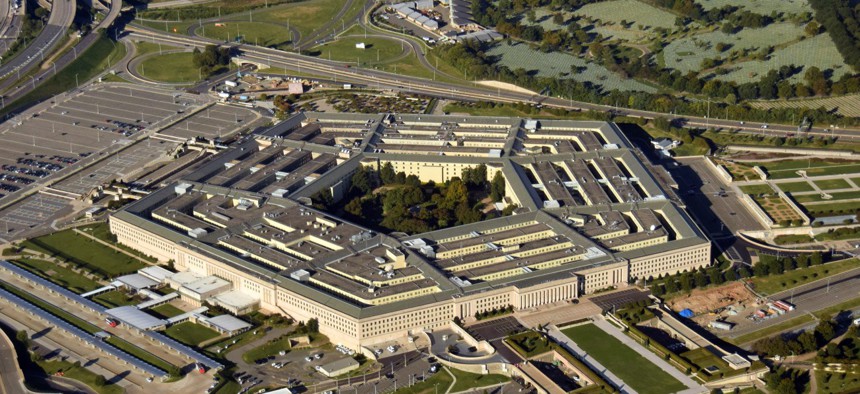
By Ivan Cholakov / Shutterstock.com
Coronavirus Roundup: Pentagon Allows Lifting of Some Travel Restrictions; More Census Operations Resume
There's a lot to keep track of. Here’s today’s list of news updates and stories you may have missed.
New York––one of the states hit hardest by the coronavirus––begins its reopening process on Monday. While the daily tally of coronavirus cases nationwide has been decreasing for several weeks, over a dozen states have experienced spikes in cases after their reopenings, The Wall Street Journal reported. Additionally, some public health experts––including Dr. Anthony Fauci, director of the National Institute of Allergy and Infectious Diseases and White House coronavirus task force member––fear a resurgence of cases following the nationwide protests in the wake of George Floyd’s death in police custody on May 25.
“As I sat in front of the TV and watched the screen go from Washington, D.C., to New York City, to Los Angeles, to Philadelphia, I got really concerned,” Fauci told the Times of London. “[After] all of the work in trying to maintain the physical distance and doing all the things, I became very concerned that we might see a resurgence.” Here are some other headlines from over the weekend and today you might have missed.
On Monday, Census operations are beginning a phased restart in California, Maryland, New Jersey, New York, Texas and Virginia. With these additions, 247 of the 248 area Census offices in the states have restarted. Also, all area census offices in Puerto Rico and the Island areas have restarted and 98.9% of the “update leave” workload is completed.
The Defense Department gave the green light on Monday to lift pandemic travel restrictions for 39 states and five countries. The decisions are “subject to the assessment of conditions at individual military installations within these areas,” the department said in a memo. Read more here.
The State Department plans to proceed with phase one of its reopening plan on June 15. Managers will be able to bring up to 40% of their teams back into workplaces, Bloomberg News reported on Monday. On May 12, Foreign Policy published a copy of the plan dubbed “Diplomacy Strong.”
Last week, a federal judge threatened to bring Trump administration lawyers into court if the agencies do not start to respond by Tuesday to Freedom of Information Act requests regarding the pandemic. The Knight First Amendment Institute at Columbia University filed a complaint in May claiming: "the White House has restricted the flow of information from the [Centers for Disease Control and Prevention] — the nation's public health agency — to the public" and the CDC "has failed to release records" detailing those restrictions,” Law360 reported on Friday.
On Friday, the Health and Human Services Department inspector general published the title of a new report on how HHS needs to “address gaps in incident response capabilities.” It said it could not publish further information due to the “current public health emergency and increased cyber-activity.” According to the IG’s website, incident response capabilities involve “detecting, reporting and responding to security incidents.”
President Trump signed an executive order late last week to roll back environmental laws to speed up federal approvals of infrastructure projects, citing an economic crisis spurred by the pandemic. The administration's deregulatory agenda has not slowed during the pandemic, which watchdogs have criticized for further risking public health.
Sen. Dianne Feinstein, D-Calif., said on Friday the administration has not responded to her May 21 letter urging it to establish a “fair and transparent” system to distribute coronavirus vaccines and treatments. “The process should consider the disproportionate burden the disease has already inflicted on communities of color, the elderly, people living in poverty and those lacking stable housing,” she wrote. “Developing an effective, efficient and transparent system now will also aid in distributing a vaccine once one is developed.”
Also on Friday, Feinstein asked CDC Director Dr. Robert Redfield to establish national guidelines for detecting asymptomatic coronavirus cases. “Across the country, outbreaks are becoming more common in workplaces and residences where people interact in close proximity to each other, such as nursing homes, food processing plants, prisons and homeless shelters,” she wrote. “Given how easily this virus spreads and that otherwise healthy-seeming individuals could be unintentionally infecting others, we must expand our efforts to detect pre-symptomatic and asymptomatic carriers in these higher risk settings.”
On Friday, Sen. Dick Durbin, D-Ill., asked the Justice Department for an update on its efforts to combat coronavirus-related price gouging. “In recent months, federal authorities and state attorneys general have reported being inundated by complaints of price-gouging involving [personal protective equipment], medical supplies, sanitizer and cleaning products, household necessities and more,” he wrote. “This price-gouging hurts consumers, families, businesses, and public entities who are scrambling to protect and sustain themselves in the face of this pandemic.” He asked for answers to his list of questions by July 3.
Upcoming: White House Press Secretary Kayleigh McEnany will hold a briefing at 2 p.m.
Today’s GovExec Daily podcast episode examines comparisons of the federal policy changes following the upheaval of the late 1960s to the potential federal opportunities post-pandemic.
Help us understand the situation better. Are you a federal employee, contractor or military member with information, concerns, etc. about how your agency is handling the coronavirus? Email us at newstips@govexec.com.







